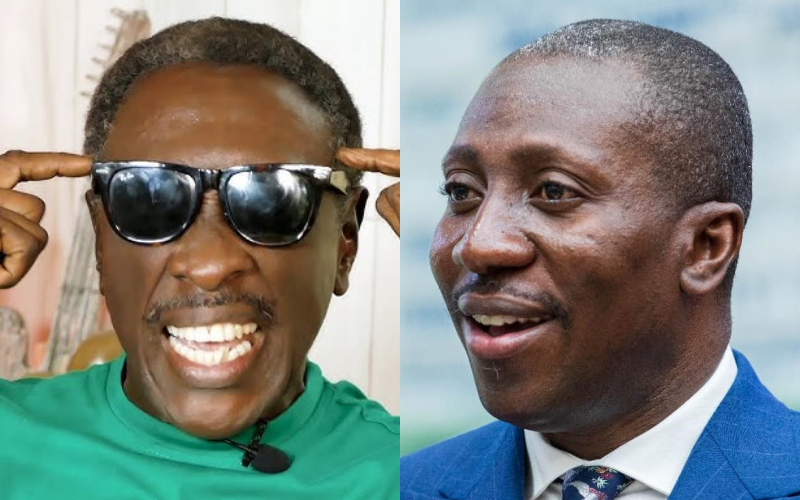Kwaku Sintim-Misa (KSM), a prominent Ghanaian satirist, media personality, and actor, recently used his popular platform, the KSM Show, to dissect the conduct of Alexander Afenyo-Markin, the Minority Leader of Parliament, during the vetting process for President John Dramani Mahama’s ministerial nominees. KSM’s critique centered on Afenyo-Markin’s dismissive stance towards the Operation Recover All Loot (ORAL) committee, an initiative established to investigate and recoup allegedly misappropriated state funds. Dubbing him “Macho Afenyo-Markin,” KSM questioned the parliamentarian’s aggressive opposition to the committee and challenged the underlying motivations behind his arguments. The core of KSM’s argument revolved around the perceived hypocrisy of Afenyo-Markin’s position. He posited that if the roles were reversed, and the New Patriotic Party (NPP) were in power seeking to recover funds allegedly mismanaged by the National Democratic Congress (NDC), Afenyo-Markin’s reaction would likely be drastically different. He suggested that instead of opposing such an initiative, Afenyo-Markin would likely champion it with fervor.
KSM’s commentary delved deeper into the implications of dismissing the ORAL committee, arguing that such a move undermines the crucial task of investigating potential financial malfeasance and recovering lost state resources. He pointed to specific examples of questionable expenditures and projects that warrant thorough investigation, including the controversial National Cathedral project and the abandoned SkyTrain initiative. The National Cathedral project, a flagship initiative of the previous administration, has been mired in controversy due to escalating costs and a lack of transparency regarding its funding and progress. Similarly, the SkyTrain project, which promised a modern transportation system for Accra, consumed significant public funds without yielding any tangible results, leaving questions about its feasibility and the management of its allocated resources. KSM argued that these instances represent potential avenues for recovering misappropriated funds and that dismissing the ORAL committee prematurely would obstruct efforts to hold those responsible accountable.
KSM’s central question to Afenyo-Markin was pointed and provocative: “Are you trying to impress us with brilliance, or are you dazzling us with bull crap?” This rhetorical question encapsulates KSM’s skepticism towards the parliamentarian’s arguments and suggests that his opposition to the ORAL committee is driven by political posturing rather than genuine concern for the public interest. He challenged Afenyo-Markin to prioritize the nation’s welfare over partisan politics, emphasizing that the recovery of potentially misappropriated funds should transcend party lines. He framed the issue as a matter of national importance, urging a focus on Ghana’s progress and the recovery of lost resources, regardless of which political party might be implicated.
KSM’s commentary underscores a broader concern about the politicization of accountability mechanisms in Ghana. His criticism of Afenyo-Markin’s stance reflects a wider frustration with the tendency of political figures to prioritize party loyalty over the national interest, particularly when it comes to issues of financial transparency and accountability. By highlighting the potential hypocrisy in Afenyo-Markin’s opposition to the ORAL committee, KSM raises questions about the sincerity of political rhetoric surrounding anti-corruption efforts. He implies that the fight against corruption should not be a selective endeavor based on political expediency but rather a consistent and principled pursuit of justice and good governance.
The examples cited by KSM, namely the National Cathedral and the SkyTrain projects, serve as concrete illustrations of the need for robust investigative mechanisms. These projects, characterized by significant public expenditure and questionable outcomes, represent potential instances of mismanagement and potential corruption that demand thorough scrutiny. KSM’s argument is that dismissing the ORAL committee would effectively shield these projects from investigation and allow potential wrongdoing to go unaddressed. He implies that the pursuit of accountability should not be hampered by political maneuvering and that mechanisms like the ORAL committee are essential for ensuring transparency and responsible use of public resources.
KSM’s concluding remarks reinforce his call for prioritizing national interests over partisan politics. His statement, “At this stage, Ghana’s progress should come first,” encapsulates the essence of his message. He argues that the recovery of potentially looted funds is not about targeting a specific political party but about safeguarding the nation’s resources and ensuring that those responsible for mismanagement are held accountable. By framing the issue in this way, KSM elevates the discussion beyond partisan bickering and emphasizes the shared responsibility of all stakeholders to protect the public interest. His commentary serves as a call for greater transparency and accountability in Ghana’s political landscape, urging politicians to prioritize the nation’s welfare over narrow political interests.


